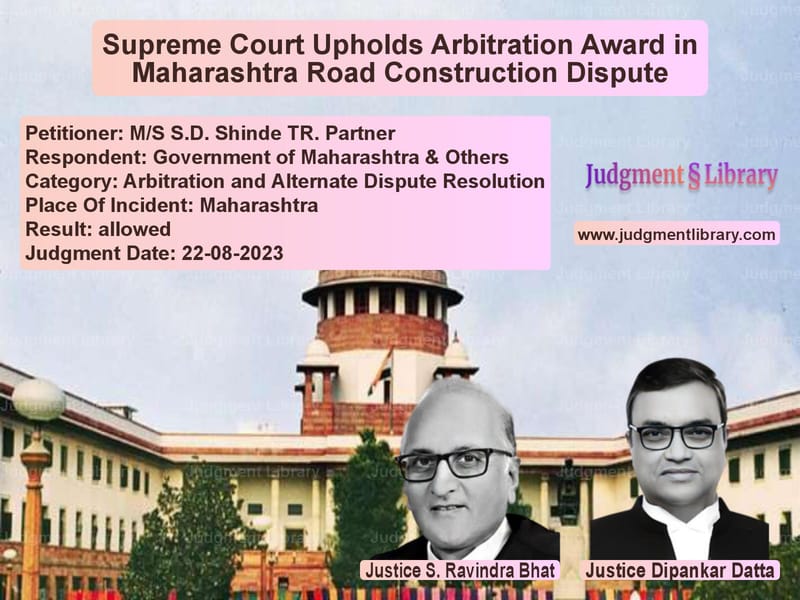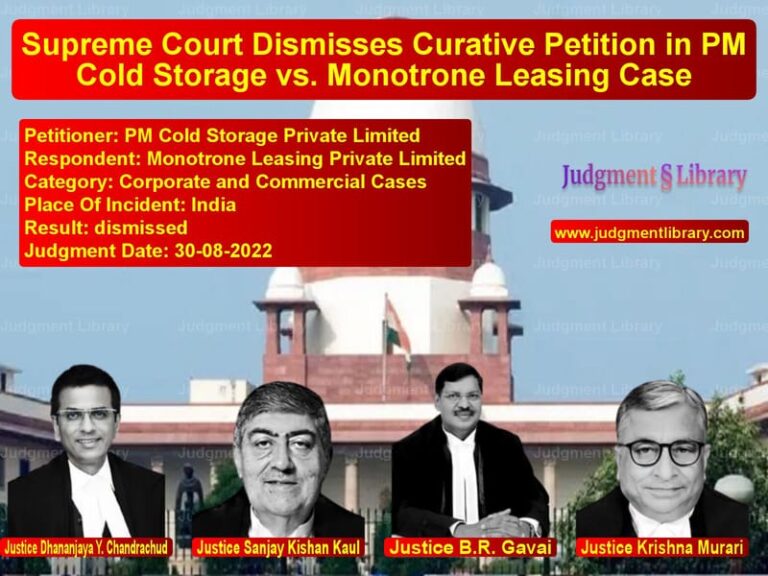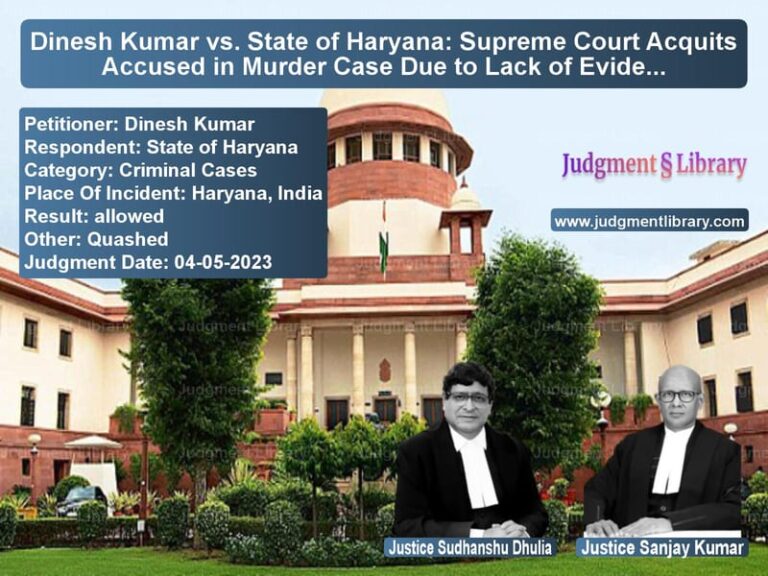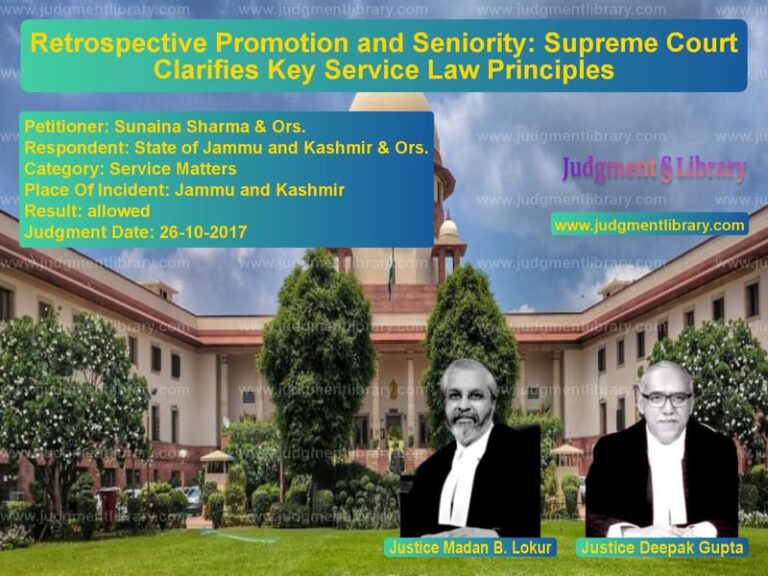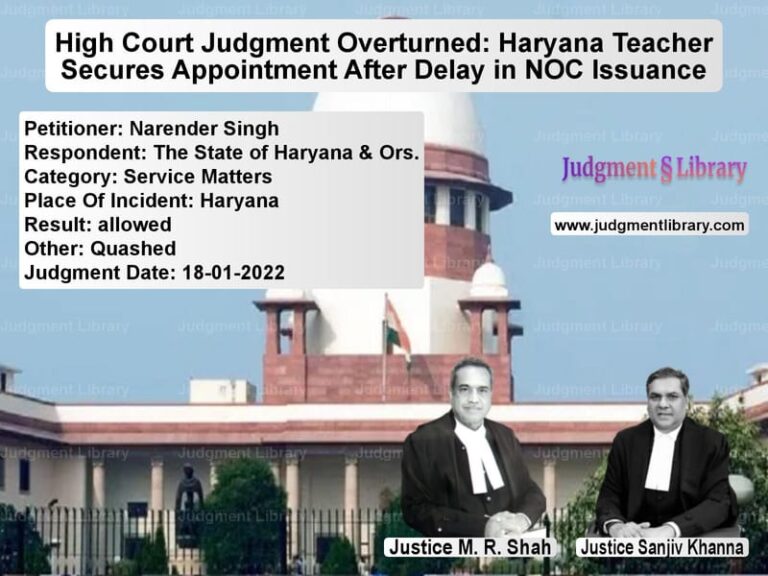Supreme Court Upholds Arbitration Award in Maharashtra Road Construction Dispute
The Supreme Court of India recently delivered a crucial judgment in the case of M/S S.D. Shinde TR. Partner v. Government of Maharashtra & Others. The case centered around a dispute related to a road construction contract awarded by the Maharashtra Irrigation Department. The Court ruled in favor of the contractor, reinstating an arbitration award that had been overturned by the lower courts. This judgment reinforces the principle that courts should not interfere in arbitration awards unless there is a clear legal misconduct.
Background of the Case
The dispute arose from a contract awarded to the appellant for the construction of the Kukadi Left Bank Canal. The contract was valued at ₹4.01 crore and had an initial completion timeline of 18 months. However, due to multiple delays not attributable to the contractor, the project extended well beyond its stipulated timeframe. The contractor claimed additional payments for extra work done beyond the scope of the original contract.
The arbitration tribunal ruled in favor of the contractor, awarding ₹1.50 crore plus interest for extra work carried out. The Government of Maharashtra challenged the award before the trial court, which set aside the award on grounds of ‘legal misconduct.’ The contractor then appealed to the Bombay High Court, which upheld the trial court’s ruling. Finally, the contractor approached the Supreme Court.
Key Legal Issues
- Whether the arbitration award was legally valid under the Indian Arbitration Act, 1940.
- Whether the contractor’s claims were time-barred.
- Whether the arbitrator exceeded the terms of reference in awarding the compensation.
- The role of courts in reviewing arbitration awards.
Petitioner’s (Contractor) Arguments
- The delays in project completion were not due to the contractor’s fault but resulted from government actions, including delayed site handover and shortage of cement supply.
- The final bill was submitted in 1992, but the government failed to settle it, leading to arbitration proceedings initiated in 1995.
- The arbitration tribunal correctly accounted for the financial losses incurred by the contractor, including overhead costs and interest.
- The High Court erred by re-evaluating the arbitrator’s findings, which is beyond its jurisdiction.
Respondent’s (Government of Maharashtra) Arguments
- The arbitration claim was filed much later than the stipulated 30-day period for dispute resolution.
- The arbitrator exceeded the terms of reference by awarding compensation for extra work not covered under the contract.
- The claim included inadmissible components such as overhead costs and loss of profit.
- The arbitration award amounted to legal misconduct and was correctly set aside by the trial court.
Supreme Court’s Judgment
The Supreme Court ruled in favor of the contractor, setting aside the lower court judgments and restoring the arbitration award. The Court made the following key observations:
- On Time-Barred Claims: The Court held that the contractor’s claim was not time-barred since the final bill was prepared in 1992 and arbitration proceedings were initiated within the prescribed limitation period.
- Scope of Judicial Review in Arbitration: The Court reiterated that “judicial intervention in arbitration is limited and should only occur in cases of manifest legal misconduct or error of law.”
- Arbitrator’s Authority: The Court found that the arbitrator acted within the terms of reference and that the award was based on evidence presented.
- Legal Misconduct: The Court held that there was no ‘legal misconduct’ as claimed by the government and that the lower courts had overstepped their jurisdiction.
Directions Issued
- The arbitration award was reinstated, and the government was directed to pay the awarded amount within eight weeks.
- The contractor was entitled to interest at the rate determined by the arbitration tribunal.
- The ruling set a precedent that courts should not interfere in arbitration awards unless there is a clear and manifest error of law.
Impact of the Judgment
This ruling has significant implications for arbitration in construction and government contract disputes:
- Limiting Judicial Interference: The judgment strengthens the principle that courts should not act as appellate bodies in arbitration cases.
- Protection of Contractors: It ensures that contractors working on government projects are not unfairly denied compensation for legitimate claims.
- Clarity on Legal Misconduct: The ruling clarifies that mere disagreement with an arbitrator’s award does not amount to legal misconduct.
Conclusion
The Supreme Court’s decision in M/S S.D. Shinde TR. Partner v. Government of Maharashtra reinforces the autonomy of arbitration tribunals and restricts unnecessary judicial interference. The ruling serves as a crucial precedent in ensuring that arbitration remains an effective dispute resolution mechanism, especially in infrastructure and government contract cases.
Petitioner Name: M/S S.D. Shinde TR. Partner.Respondent Name: Government of Maharashtra & Others.Judgment By: Justice S. Ravindra Bhat, Justice Dipankar Datta.Place Of Incident: Maharashtra.Judgment Date: 22-08-2023.
Don’t miss out on the full details! Download the complete judgment in PDF format below and gain valuable insights instantly!
Download Judgment: ms-s.d.-shinde-tr.-vs-government-of-mahara-supreme-court-of-india-judgment-dated-22-08-2023.pdf
Directly Download Judgment: Directly download this Judgment
See all petitions in Arbitration Awards
See all petitions in Dispute Resolution Mechanisms
See all petitions in Arbitration Act
See all petitions in Enforcement of Awards
See all petitions in Judgment by S Ravindra Bhat
See all petitions in Judgment by Dipankar Datta
See all petitions in allowed
See all petitions in supreme court of India judgments August 2023
See all petitions in 2023 judgments
See all posts in Arbitration and Alternate Dispute Resolution Category
See all allowed petitions in Arbitration and Alternate Dispute Resolution Category
See all Dismissed petitions in Arbitration and Alternate Dispute Resolution Category
See all partially allowed petitions in Arbitration and Alternate Dispute Resolution Category

